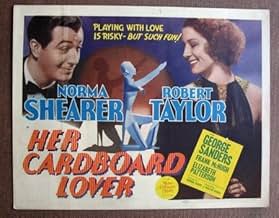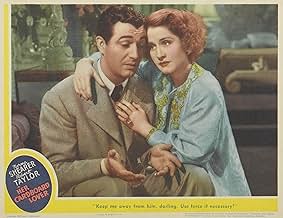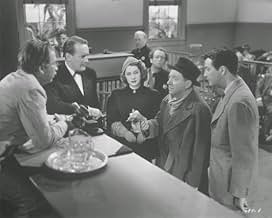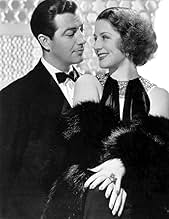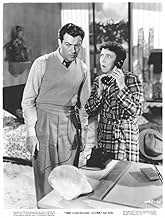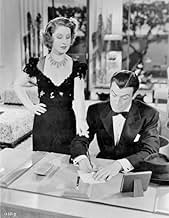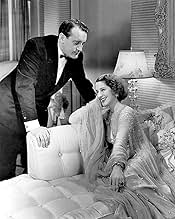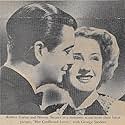Ajouter une intrigue dans votre langueA wealthy woman, trying to discourage a former boyfriend from pursuing her, hires a young songwriter who needs money to pay off his gambling debts to pretend to be her boyfriend. The problem... Tout lireA wealthy woman, trying to discourage a former boyfriend from pursuing her, hires a young songwriter who needs money to pay off his gambling debts to pretend to be her boyfriend. The problem is that the phony boyfriend is really in love with her.A wealthy woman, trying to discourage a former boyfriend from pursuing her, hires a young songwriter who needs money to pay off his gambling debts to pretend to be her boyfriend. The problem is that the phony boyfriend is really in love with her.
- Réalisation
- Scénario
- Casting principal
- Police Officer in Courtroom
- (non crédité)
- Waiter
- (non crédité)
- Casino Patron
- (non crédité)
- Elevator Operator
- (non crédité)
- Arresting Plainclothesman
- (non crédité)
- Drunk in Courtroom
- (non crédité)
- Casino Page
- (non crédité)
- Courtroom Spectator
- (non crédité)
- Casino Patron
- (non crédité)
- Croupier
- (non crédité)
- Dogar - Hotel Desk Clerk
- (non crédité)
- Casino Patron
- (non crédité)
Avis à la une
"Her Cardboard Lover" is a sophisticated comedy that capitalizes on the strength of its stars. The screen play by Valerie Wyngate has some ups and downs in it that even the great Cukor wasn't able to solve. First, there is a marked age difference between the stars, not because Ms. Shearer looks older, on the contrary, she is in excellent form, but Mr. Taylor appears to be much younger.
The film has some good moments for everyone. The best thing Mr. Cukor was able to do was to give the suave George Sanders the part of Tony Barling, the playboy who comes back to claim the love of Consuelo Croyden. They have parted in a bad way, but there's still something between the former lovers. By hiring Terry Trindale as the "fake" lover, in order to make Tony Barling jealous, a new dynamic enters into play.
There are two extraordinary sequences toward the end of the film. The first one is the fight between Tony and Terry in the hotel's pantry when dishes, vases, and all kinds of porcelain gets smashed against walls. The second one is in the court that is presided by judge Sam, brilliantly portrayed by Chill Wills. The acting is first rate by this marvelous cast. In minor roles Frank McHugh and Elizabeth Patterson shine.
The film is a light comedy that is a delight to watch.
It then went to the silent screen the following year with Marion Davies and Nils Asther in the leads and scored a modicum of success there. But the most bizarre adaption was yet to come. In 1932 the story was reworked for Buster Keaton and Jimmy Durante in the The Passionate Plumber. Irene Purcell is the female lead. Which brings us to the last and least version of this story.
I've a theory that Norma Shearer chose this vehicle to show Marion Davies that she could do one of her roles better. What other explanation could there be for turning down Mrs. Miniver as her farewell picture for this. And would you ever believe that Robert Taylor and Buster Keaton would play the same part on screen?
Shearer and Davies were a pair of feuding stars at MGM while Davies was there. Shearer was married to the boss, Irving Thalberg and Davies had her patron William Randolph Hearst who bought his way on to the lot. It's now conceded that Davies had a real flair for comedy, but that Hearst just could only see her as the heroine of many a drama. Shearer was a great dramatic actress who never quite scored in comedy. I'm betting for her final film she was going to show the retired Davies that she could do it better.
Well she didn't. In fact if any of P.G. Wodehouse's wit survived in this film, I must have dozed off. What emerges is a pleasant innocuous comedy which would have been long forgotten had it not been Norma Shearer's last film. When we first meet Shearer she's trying to fend off the advances of an amorous Taylor who has fallen in love at first sight. But later on she thinks he might be useful in fending off George Sanders's advances. She's trying real hard to dump the cad, but he's one charming rogue. So Norma hires Bob as Her Cardboard Lover to pretend he's the new man in her life. I think you can guess where this is going.
Shearer did not get quite the sendoff from the big screen that she thought she would have gotten, surely not anything like Mrs. Miniver would have been. For Taylor, he's pleasant enough, but if you want to see him and Shearer in much better form look at the 1940 film Escape.
To do this, she has Robert Taylor, a songwriter who's crazy about her, work off his gambling debt by pretending to be her boyfriend.
A nice dramatic role would have been better for Shearer's final performance. But like Garbo, she went out with a comedy, and one that bombed at that, also like Garbo.
One wonders what MGM was thinking. The dilemma seems to have been finding vehicles for these older stars as the world - and they - were changing.
The film was made in 1942, and though it is a delightful comedy, it really has the look and feel of the '30s to it. There are some wonderful scenes - one where Taylor threatens to jump over a balcony and a dandy fight scene at the end. But in spots, it seems a little tired.
Norma Shearer wears gorgeous clothes and is over-dramatic, which is what the part called for. Robert Taylor does a fine job, and George Sanders was wasted.
One of the comments said that Shearer was too old for the role - yet the actors seem properly matched and this writer, anyway, had no idea of Shearer's age.
In the end, though, it wasn't a fitting way for her to go out. The role hearkens back to a much earlier time. Perhaps, in the end, that's what she wanted.
Le saviez-vous
- AnecdotesFinal film of Norma Shearer.
- Citations
Terry Trindale: Who shall I say it's from, her lawyer?
Tony Barling: Lawyer? Hardly.
Terry Trindale: Well if this were bad news...
Tony Barling: Do I look like bad news?
- Crédits fous"The End. America Needs Your Money. Buy War Bonds And Stamps Every Pay Day."
- ConnexionsVersion of The Cardboard Lover (1928)
- Bandes originalesI Dare You
(1942) (uncredited)
Music by Burton Lane
Lyrics by Ralph Freed
Played during the opening credits and often as background music
Played on piano by Robert Taylor
Reprised on piano by Robert Taylor and sung by him and Frank McHugh
Sung a cappella by Norma Shearer
Meilleurs choix
Détails
Box-office
- Budget
- 979 000 $US (estimé)
- Durée1 heure 33 minutes
- Couleur
- Rapport de forme
- 1.37 : 1
Contribuer à cette page



